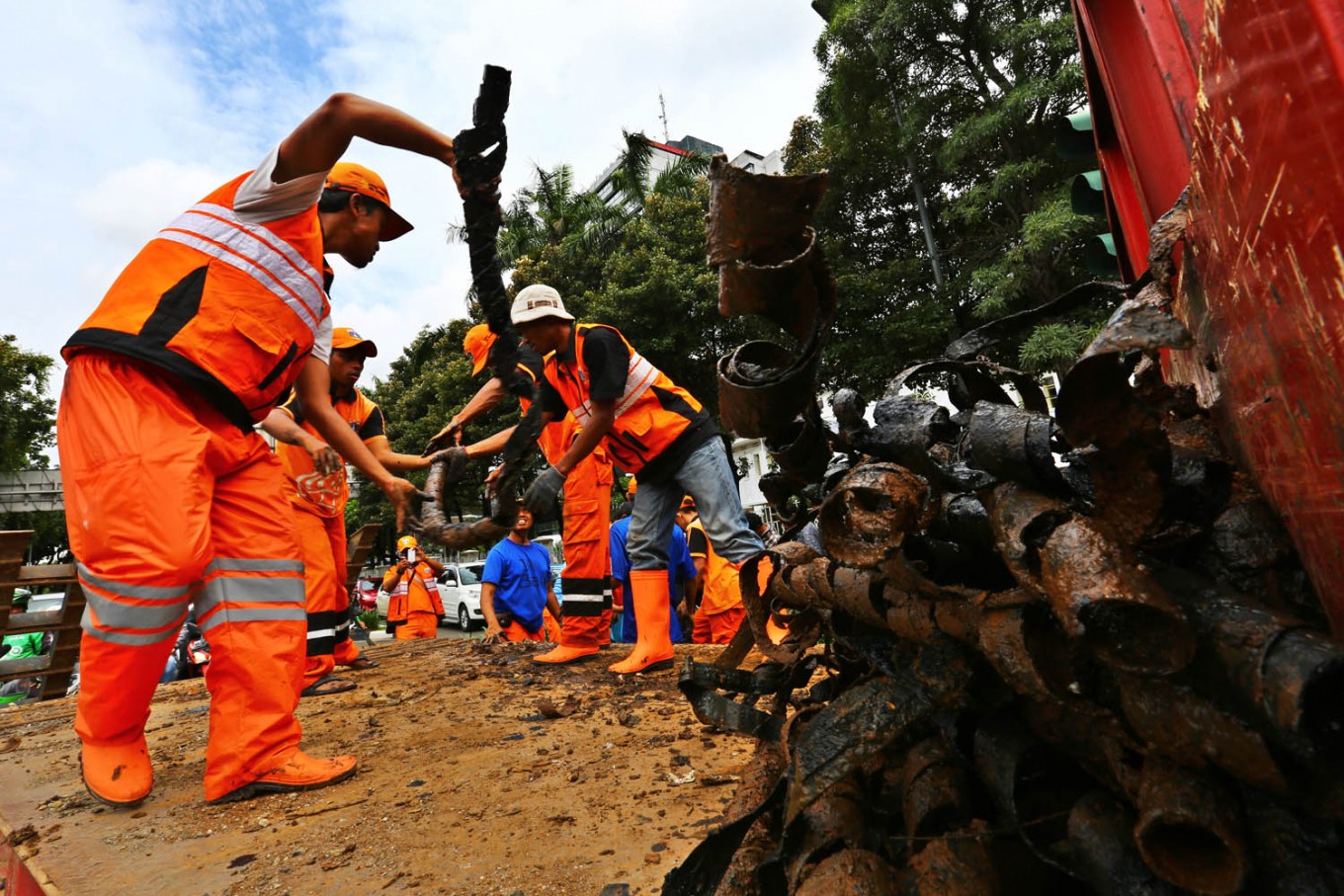Popular Reads
Top Results
Can't find what you're looking for?
View all search resultsPopular Reads
Top Results
Can't find what you're looking for?
View all search resultsElevated risk: Jakarta public facility workers maintain routine with extra caution
Special protocols and shorter working hours are in place to reduce the risk of COVID-19 infection among workers cleaning Jakarta and maintaining public facilities in the capital.
Change text size
Gift Premium Articles
to Anyone
C
oncerned about the highly infectious coronavirus, Firmansyah Putra washes his orange uniform and takes a bath as soon as he arrives home from work.
The 25-year old, who lives in Tanjung Priok, North Jakarta, then washes his hands and uses hand sanitizer before holding his 3-months-old son.
A new father, Firman tries to apply a high standard of personal hygiene during the COVID-19 pandemic.
“My wife also reminds me to wash my hands and apply hand sanitizer often, as we now have a baby,” he told The Jakarta Post.
“Given the news reports that people infected by the virus could be asymptomatic, it is better to take all necessary precautions,” he added.
Firman works for the Jakarta Public Facility Maintenance Agency (PPSU), widely known as the “orange troops” in reference to the color of the uniforms. Unable to work from home during the outbreak, they are at an elevated risk of contracting the virus.
On regular days, he works eight hours, mainly to sweep major streets in Sunter Agung, Tanjung Priok. However, for the past 10 days, Firman has been working shorter hours, in line with a policy his office introduced to protect its workers from coronavirus infections.
"Now the PPSU works five hours a day and there are no more roll calls nor morning briefings at the Sunter Agung subdistrict office [which is also the headquarters of his PPSU team]," he said.
Firman said his superior, through WhatsApp’s group chats, often reminded the PPSU workers to maintain a physical distance as well as to wear masks and gloves during work hours.
“And now, we are only allowed to gather in groups of no more than four people during breaks. Everyone must sit down [or stand] at least 1 meter from their peers,” he added.
The COVID-19 pandemic has significantly changed the way people perform their duties, with many companies and institutions eliminating some tasks their workers normally do.
Many deem the orange troops “heroes” for ensuring the clean face of the capital.
Apart from cleaning, the PPSU workers often perform jobs in residential areas, such as cleaning up mud or removing fallen trees.
During the COVID-19 pandemic, Firman said, many subdistrict heads in Jakarta prohibited the orange troops from entering residential areas in an effort to prevent the workers from contracting the virus.
“If the community unit [RW] head asked us, we would reject the request. They [RW management] need to handle their [cleanliness] issue using their own resources,” Firman said.
According to Firman, the number of such requests has fallen a lot since the Jakarta administration called on the public to stay at home.
North Jakarta Mayor Sigit Wijatmoko recently issued a circular stipulating that PPSU workers who are more than 50 years old, pregnant, breastfeeding mothers, suffer from hypertension, heart disease, lung disease or other underlying health problems should stay at home.
In North Jakarta, all the orange troops working in the field and outdoors are given masks and hand sanitizer.
Despite the reduced workload and shorter working hours, Firman said, the workers were paid their full salary.
In addition to 2,000 orange troops in 267 subdistricts across the capital, Jakarta also employs contract workers for tasks under the Jakarta Water Resources Agency, Park and Forestry Agency and Bina Marga Road Agency.
Jakarta Water Resources Agency head Juaini Yusuf, who heads around 7,000 contract workers known as the “blue troops”, said he had issued a similar circular aimed to protect the agency’s workers from the coronavirus.
“The circulation is based on instructions issued by the World Health Organization [WHO] and the Jakarta Health Agency, as well as a Jakarta gubernatorial instruction on handling COVID-19,” he said, adding that handwashing and the use of face masks were mandatory for the blue troops, particularly those cleaning gutters.
As frontline workers dealing with garbage, workers of the Jakarta Environment Agency must strictly follow health protocol during the pandemic, the agency's spokesperson, Yogi Ikhwan, said.
“All workers must wear complete personal protective equipment based on their work risk, practice physical distancing with a minimum of 1 m between workers and wash their hands before and after performing duties,” he said.
The instruction applies to more than 13,000 workers under the Environment Agency – most of whom are assigned to collecting garbage, drive garbage trucks, clean rivers and reservoirs -- and workers at the Bantar Gebang landfill in Bekasi, West Java.
The Jakarta Bina Marga Road Agency has also issued a circular on COVID-19 prevention in ongoing projects, such as road repairs and overpass construction, stipulating that all projects must have a COVID-19 prevention task force and provide health facilities for workers.










